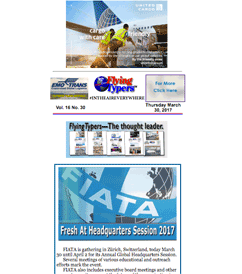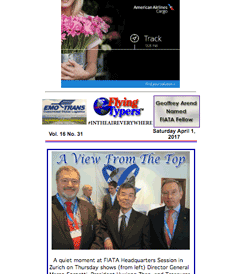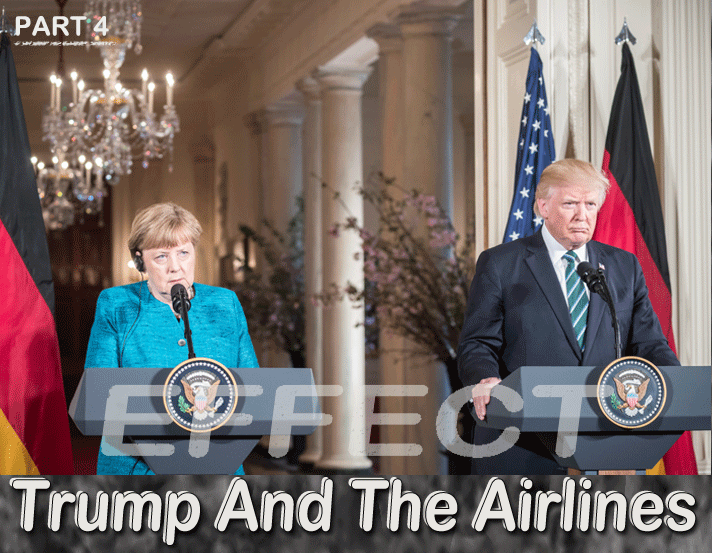
Is Anybody
Happy?
German Chancellor Angela Merkel (L)
with President Donald Trump at their joint press conference recently.
Now with the age-old question of subsidies and airlines versus trade
again in the spotlight, many wonder if a balance will be struck. |
(Part Four Of An Exclusive Series)—It’s
been almost three months since President Trump took office and he is 100
percent focused on his three primary goals: security, improving the U.S.
economy to at least a 3.0 GNP, and revitalizing infrastructure.
On The Job
Lessons
President Trump is learning how to operate with
the political system, as was evident in his recent failure to overhaul
the U.S. Affordable Health Care System called Obamacare.
Impact On
Airlines
The three goals and their many aspects will have
a direct effect on the airline industry. In my previous articles I have
covered the Trump Administration’s goal of improving the U.S. economy
by discussing the possible implications of trade, increased U.S. jobs,
and the effect of the U.S. dollar on the airline industry.
In all of this I strived to remain neutral and
cover the facts as I know them and list both the possible positive as
well as negative effects of these policies on our industry.
In this article, I will attempt to cover the
possible effect of President Trump’s “Make America Great Again”
efforts on airline routes and jobs.
To do this, I will cover two areas that U.S.
airlines have been complaining about: foreign airline government subsidies
and the U.S. government’s open skies policy.
Mums The
Word
The airlines have been relatively silent about
Airline Alliances.
One could argue that these two complaints by
U.S. airlines negatively affect U.S. jobs, industry growth, and airline
profitability.
On the other hand, one could also argue that
these help U.S. airlines by extending their route coverage, lowering their
costs, and increasing their profitability.
Subsidies
Same Old Song
Ever since I started in this business in the
1960s, there have been complaints about foreign governments’ subsidies
through direct or indirect ownership of their national carrier.
Over the years, direct government ownership of
the national carriers has been reduced.
But today there are renewed claims that some
carriers are subsidized directly or indirectly by their governments through
lower fuel prices, anti-union labor laws, lower airport landing fees,
better gate position, lower pilot and cabin crew costs as well as lowering
of other airline labor costs.
Like It Is
Over There
When it comes to doing business, the laws and
policies of respective home markets drive all of the above listed activities
directly or indirectly.
It is claimed that, as example, the carriers
can charge lower ticket costs than U.S. airlines and therefore have an
unfair competitive advantage.
If one read my last article on trade, one could
draw the same conclusions for China’s advancement on trade.
But, unlike what is provable about China’s
trade advantage, for years U.S. airlines have been trying to prove the
existence of direct and indirect subsidies for some foreign national carriers
without much success.
The Big Question
The question is whether the Trump Administration
will have a sympathetic ear to these airline complaints and use its power
to deeply investigate their effect on U.S. trade; some experts estimate
40 percent of U.S. trade value is transported by air.
Open Skies
Here again the airlines and their unions have
been complaining that giving other countries free access to the total
U.S. market in return for access to their country’s total market
is not a fair trade.
So again, just like President Trump wanting “fair”
trade agreements, will this administration change its open skies policy
for a “fairer deal?”
Trade Policy
& The Airlines
It has been argued by airlines, their unions,
and their employees that these policies hamper their international growth
and ability to buy long range widebody aircraft, and force them to give
lower rates to match the non-U.S. competitor airlines, whom they view
as government-subsidized carriers. The alternative option is to withdraw
from those markets.
They claim this costs American jobs as well as
growth to the U.S. airline industry.
Questions
Questions Questions
The question is whether U.S. airlines will now
push the subsidy and open skies issues through their lobbying efforts
and will the Trump Administration weigh the effect of the issues on the
U.S. economy and job growth similarly to the way the administration is
looking at “Fair Trade”?
Will Trump even go as far as stating, “Made
in America – Flown by America?”
If the Trump Administration does, what pressure
will the foreign airlines and the governments that support those airlines
exert?
And finally, will elimination of these policies
weaken or strengthen the present airline alliances?
Manage The
Risk
The risk, which President Donald Trump is certainly
aware of by now, is that including these airline matters may overload
and slowdown the U.S. administration’s focus on renegotiating its
trade routes to gain “fair deals”.
The biggest question in all of this for U.S.
flags (and everybody else) is whether efforts to drive better airline
deals will take a back seat to other bigger trade deals that the U.S.
Government may consider more important.
Maybe President Trump should follow the famous
reasoning made immortal from the writings of T.S. Eliot:
“Only
those who will risk going too far can possibly find out how far one can
go.”
Bill Boesch
| 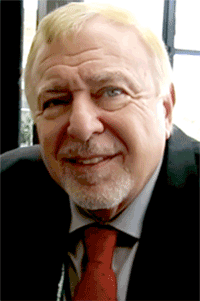 Mr.
Boesch started his career in global transportation and logistics
in 1965 working for Seaboard World Airlines. He later joined Flying
Tiger Airlines and Emery Worldwide. Mr. Boesch then left Emery to
become Pan American World Airways’ Senior Vice President where
he headed both Passenger and Cargo Sales and Operations. He left
Pan Am to lead American Airlines’ Cargo operation and retired
from AA in 1998. Under his direction American became a world leader
in the air cargo and logistics business. Mr.
Boesch started his career in global transportation and logistics
in 1965 working for Seaboard World Airlines. He later joined Flying
Tiger Airlines and Emery Worldwide. Mr. Boesch then left Emery to
become Pan American World Airways’ Senior Vice President where
he headed both Passenger and Cargo Sales and Operations. He left
Pan Am to lead American Airlines’ Cargo operation and retired
from AA in 1998. Under his direction American became a world leader
in the air cargo and logistics business.
Mr.
Boesch was part of the extensive on site planning and support of
the Iraq drawdown, involvement with the Afghanistan operations,
and has worked on all aspects of the Civil Reserve Air Fleet (CRAF)
from both an airline and government standpoint.
Mr. Boesch has also served as Chairman
of the International Air Transport Association (IATA) Cargo Executive
Subcommittee in 1996 and 1997, Vice Chairman of IATA’s Cargo
Committee. Mr. Boesch served on the Board of Directors of Air Cargo
Incorporated, Air Cargo International, The International Air Cargo
Association (TIACA), Envirotainer, Cargo Logistics Solutions, Deutsche
Post/DHL Global Mail, al Seqir and consulted for major U.S. companies
including Flight Safety.
Mr. Boesch is the recipient of numerous
awards including the Lifetime Air Cargo Achievement Award, the Ellis
Island Medal of Honor and various awards from the U.S. Department
of Defense.
Mr. Boesch is presently continuing
his work for the U.S. Government and heads up The Council For Logistics
Research.
|
To Read Part 1 of This Series, Click Here
To Read Part 2 of This Series, Click Here
To Read Part 3 of This Series, Click Here
To Read Trump Effect—India Walks Softly Carries Big Stick, Click
Here
To Read Trump Effect—Implications Of A Trump Trade War, Click Here
To Read Trump Effect—Trump Across The Pacific, Click Here |
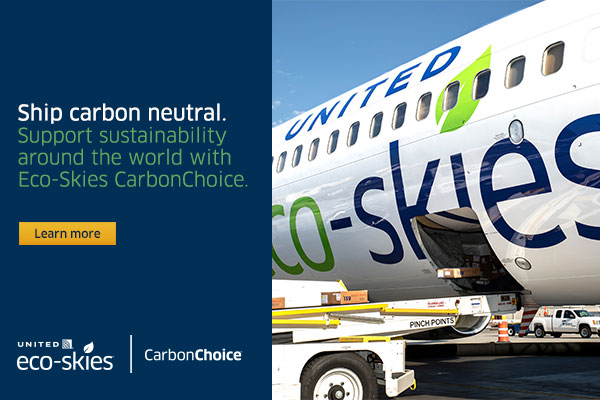




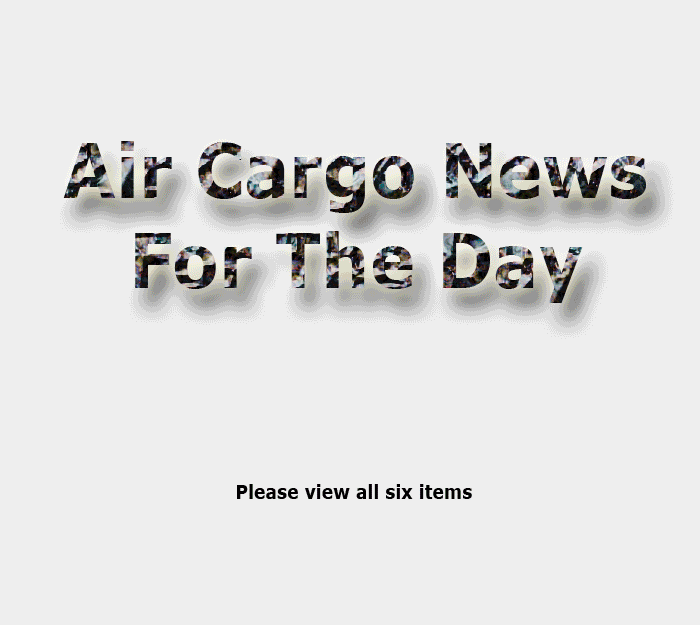
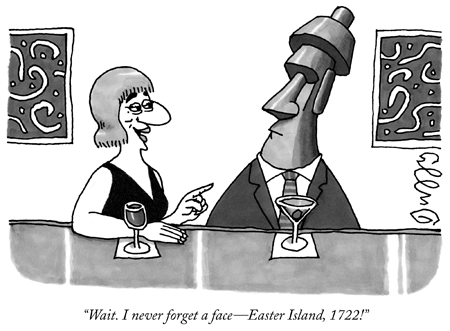

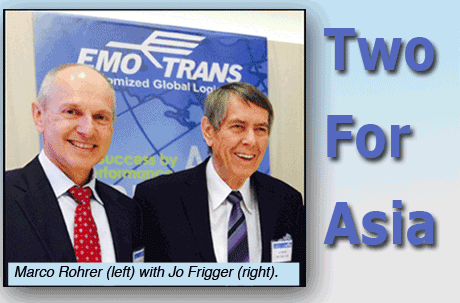 EMO
Trans opened new offices in Asia, including EMO Trans China Ltd., branch
offices in Chengdu on January 1, and Beijing on March 13.
EMO
Trans opened new offices in Asia, including EMO Trans China Ltd., branch
offices in Chengdu on January 1, and Beijing on March 13.